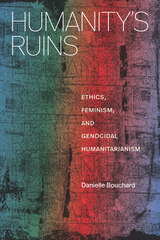7 books about Public Good
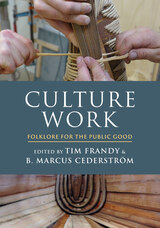
Culture Work
Folklore for the Public Good
Tim Frandy and B. Marcus Cederström
University of Wisconsin Press, 2022
How do culture workers construct public arts and culture projects that are effective and transformative? How do we create public humanities projects of the community, for the community, and with the community? How can culture work make a concrete difference in the quality of life for communities, and lead to the creation of a more just world? Why do the public humanities matter? Culture Work explores these questions through real-world examples of cultural and public humanities projects. The innovative case studies analyzed in the book demonstrate the vast numbers of creative possibilities in culture work today—in all their complexities, challenges, and potentialities.
Thematically arranged chapters embody the interconnected aspects of culture work, from amplifying local voices to galvanizing community from within, from preservation of cultural knowledge to its creative repurposing for a desired future. These inventive projects provide concrete examples and accessible theory grounded in practice, encourage readers to embark on their own public culture work, and create new forward-looking inspiration for community leaders and scholars in the field.
Thematically arranged chapters embody the interconnected aspects of culture work, from amplifying local voices to galvanizing community from within, from preservation of cultural knowledge to its creative repurposing for a desired future. These inventive projects provide concrete examples and accessible theory grounded in practice, encourage readers to embark on their own public culture work, and create new forward-looking inspiration for community leaders and scholars in the field.
[more]
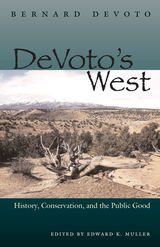
DeVoto’s West
History, Conservation, and the Public Good
Bernard DeVoto
Ohio University Press, 2005
Social commentator and preeminent Western historian Bernard DeVoto vigorously defended public lands in the West against commercial interests. At his death in 1955, DeVoto had won both the Pulitzer and Bancroft prizes. But he was most famous for his eloquent writing that advocated conservation of America's prairies, rangeland, forests, mountains, canyons, and deserts.DeVoto's West: Essays on History, Conservation, and the Public Good showcases the complexity, depth, and breadth of DeVoto's thinking. Editor Edward K. Muller introduces these twenty-two essays (many of which originally appeared in Harper's renowned column The Easy Chair) that passionately and coherently advocate federal control for vast tracts of public land. DeVoto addressed many issues, including the plundering of resources by absentee eastern corporations, Westerners' conflicted relationship to exploitation, and the degradation of the national parks. He believed that conservation of natural resources in the West required government control of public lands against livestock associations, timber interests, and their congressional allies who plotted the privatization of the national forests and the extraction of resources in the national parks.DeVoto's West collects the best of DeVoto's conservation pieces for the first time. It will introduce a new generation to prose that has retained its relevance and remains a remarkably current and timely argument for protecting public lands. Bernard DeVoto was born in Ogden, Utah, in 1897. He spent his adult life in the East, first teaching English at Northwestern University, Chicago, then living in New York, and finally settling in Cambridge, Massachusetts. He is the subject of an acclaimed biography, The Uneasy Chair, by Wallace Stegner.
[more]

Education and the Public Good
The Federal Role in Education and The Challenge to Education in a Changing World
Edith Green and Walter P. Reuther
Harvard University Press
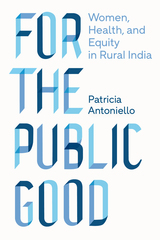
For the Public Good
Women, Health, and Equity in Rural India
Patricia Antoniello
Vanderbilt University Press, 2020
For the Public Good details the role of the Comprehensive Rural Health Project (CRHP), a groundbreaking, internationally recognized primary health care model that uses local solutions to solve intractable global health problems. Emphasizing equity and community participation, this grassroots approach recruits local women to be educated as village-based health workers. In turn, women village health workers collaborate to overcome the dominant double prejudices in local villages—caste and gender inequality.
In one generation, village health workers have progressed from child brides and sequestered wives to knowledgeable health practitioners, valued teachers, and community leaders. Through collective efforts, CRHP has reduced infant and maternal mortality, eliminated some endemic health problems, and advanced economic well-being in villages with women's cooperative lending groups.
This book describes how the recognition and elimination of embedded inequalities—in this case caste discrimination, gender subordination, and class injustice—promote health and well-being and collaboratively establish the public good.
In one generation, village health workers have progressed from child brides and sequestered wives to knowledgeable health practitioners, valued teachers, and community leaders. Through collective efforts, CRHP has reduced infant and maternal mortality, eliminated some endemic health problems, and advanced economic well-being in villages with women's cooperative lending groups.
This book describes how the recognition and elimination of embedded inequalities—in this case caste discrimination, gender subordination, and class injustice—promote health and well-being and collaboratively establish the public good.
[more]
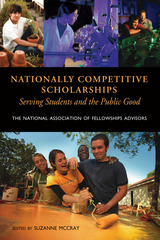
Nationally Competitive Scholarships
Serving Students and the Public Good
Suzanne McCray
University of Arkansas Press, 2007
Guidance for students applying for national scholarships Nationally competitive scholarship programs attract thousands of applicants every year for a relatively small number of awards. Providing informed and dedicated support to applicants is the critical and fundamental goal of the National Association of Fellowships Advisors (NAFA). The thirteen essays in this volume are a direct result of the 2005 NAFA conference held in Louisville. Contributors include both scholarship advisors and representatives of the Truman and Marshall foundations as well as the former executive director of the US-UK Fulbright Commission. These essays provide practical information ranging from helping faculty write persuasive letters of recommendation to serving international students effectively to negotiating the British and Irish high-educational systems. In addition to providing the students with useful tips, these essays also reflect on the broader impact of the application process. They address the successes of students who do not win as well as the public-service involvement of those who do as they give back to their campus, local, and global communities.
[more]
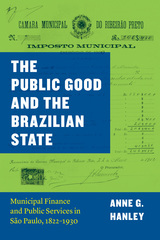
The Public Good and the Brazilian State
Municipal Finance and Public Services in São Paulo, 1822–1930
Anne G. Hanley
University of Chicago Press, 2018
Who and what a government taxes, and how the government spends the money collected, are questions of primary concern to governments large and small, national and local. When public revenues pay for high-quality infrastructure and social services, citizens thrive and crises are averted. When public revenues are inadequate to provide those goods, inequality thrives and communities can verge into unrest—as evidenced by the riots during Greece’s financial meltdown and by the needless loss of life in Haiti’s collapse in the wake of the earthquake.
In The Public Good and the Brazilian State, Anne G. Hanley assembles an economic history of public revenues as they developed in nineteenth-century Brazil. Specifically, Hanley investigates the financial life of the municipality—a district comparable to the county in the United States—to understand how the local state organized and prioritized the provision of public services, what revenues paid for those services, and what happened when the revenues collected failed to satisfy local needs. Through detailed analyses of municipal ordinances, mayoral reports, citizen complaints, and financial documents, Hanley sheds light on the evolution of public finance and its effect on the early economic development of Brazilian society. This deeply researched book offers valuable insights for anyone seeking to better understand how municipal finance informs histories of inequality and underdevelopment.
In The Public Good and the Brazilian State, Anne G. Hanley assembles an economic history of public revenues as they developed in nineteenth-century Brazil. Specifically, Hanley investigates the financial life of the municipality—a district comparable to the county in the United States—to understand how the local state organized and prioritized the provision of public services, what revenues paid for those services, and what happened when the revenues collected failed to satisfy local needs. Through detailed analyses of municipal ordinances, mayoral reports, citizen complaints, and financial documents, Hanley sheds light on the evolution of public finance and its effect on the early economic development of Brazilian society. This deeply researched book offers valuable insights for anyone seeking to better understand how municipal finance informs histories of inequality and underdevelopment.
[more]
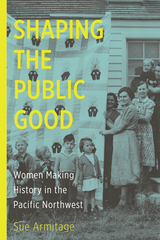
Shaping the Public Good
Women Making History in the Pacific Northwest
Sue Armitage
Oregon State University Press, 2015
Carved into a rock overlooking the Columbia River stands the arresting image of Tsagaglalal, or “She Who Watches,” an ancient female chief. As the Wishram people recount, when men replaced women in positions of power, Tsagaglalal was turned to stone by Coyote so that she could forever guide her community and guard its development.
Using the story of She Who Watches as her guide, Armitage shows that even though women were barred from positions of public authority until recently, they have always worked quietly and informally to assure the stability and security of their families and communities. Women’s community-building and cooperative skills have been decisive in developing the societies of the Pacific Northwest—Washington, Oregon, Idaho, western Montana, and British Columbia. Like She Who Watches, women have never been mere observers, but watchful guardians and active shapers of the public good.
Drawing on her three decades of research and teaching and based on hundreds of secondary sources, Armitage’s account explores the varied ways in which, beginning in the earliest times and continuing to the present, women of all races and ethnicities have made the history of our region. An accessible introduction for general readers and scholars alike, Shaping the Public Good restores a missing piece of Pacific Northwest history by demonstrating the part that women—“the famous, the forgotten, and all the women in between”—have always played in establishing their families and building communities.
Using the story of She Who Watches as her guide, Armitage shows that even though women were barred from positions of public authority until recently, they have always worked quietly and informally to assure the stability and security of their families and communities. Women’s community-building and cooperative skills have been decisive in developing the societies of the Pacific Northwest—Washington, Oregon, Idaho, western Montana, and British Columbia. Like She Who Watches, women have never been mere observers, but watchful guardians and active shapers of the public good.
Drawing on her three decades of research and teaching and based on hundreds of secondary sources, Armitage’s account explores the varied ways in which, beginning in the earliest times and continuing to the present, women of all races and ethnicities have made the history of our region. An accessible introduction for general readers and scholars alike, Shaping the Public Good restores a missing piece of Pacific Northwest history by demonstrating the part that women—“the famous, the forgotten, and all the women in between”—have always played in establishing their families and building communities.
[more]
READERS
Browse our collection.
PUBLISHERS
See BiblioVault's publisher services.
STUDENT SERVICES
Files for college accessibility offices.
UChicago Accessibility Resources
home | accessibility | search | about | contact us
BiblioVault ® 2001 - 2025
The University of Chicago Press






